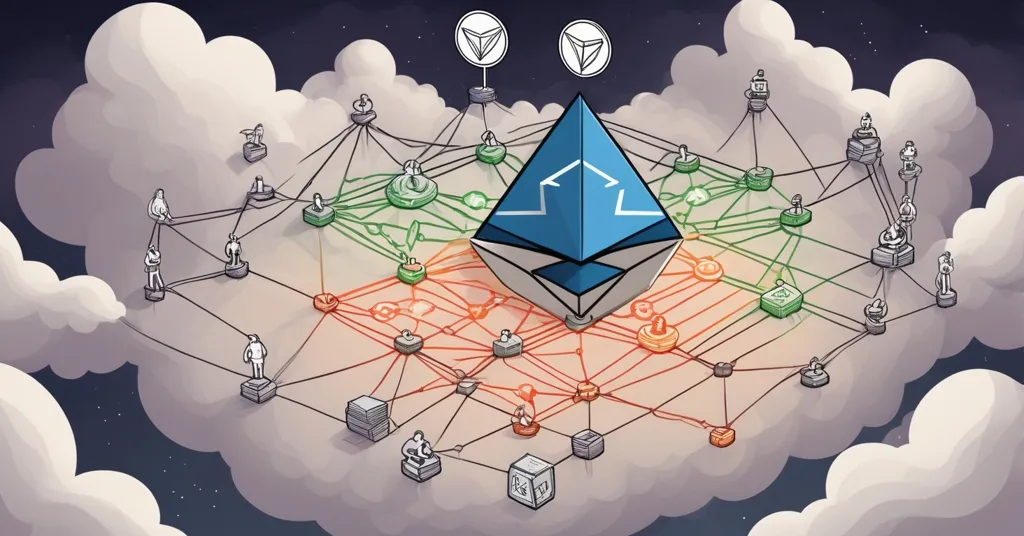Scroll Co-Founder Warns: Ethereum Fees on Rollups Toxic for Scalability

Scroll Co-Founder Warns Against Ethereum Fees on Layer-2 Rollups, Calls It Toxic for Ethereum Scalability
Ye Zhang, co-founder of the layer-2 platform Scroll, has sounded the alarm on proposals to impose fees on Ethereum rollups, labeling them as “one of the most toxic ideas for Ethereum’s future.” His critique underscores a pivotal debate about Ethereum’s path forward: should it chase short-term revenue or prioritize long-term scalability and ecosystem growth?
- Ye Zhang criticizes Ethereum rollup fee proposals
- Fees seen as toxic for Ethereum’s future
- Ethereum’s role as a hub asset emphasized
Rollups, for those new to the crypto space, are layer-2 solutions that bundle multiple transactions into a single transaction on the Ethereum blockchain, improving scalability and reducing fees. Zhang’s argument is straightforward: charging fees on these rollups would sacrifice long-term scalability and ecosystem growth for short-term revenue. He warns that such a move could drive rollups to seek alternative data availability solutions—essentially, ways to store and access transaction data outside of Ethereum—potentially weakening Ethereum’s position in the blockchain landscape.
“One of the most toxic ideas for Ethereum’s future,” Zhang stated, emphasizing the potential harm of these fee proposals. Ethereum’s strength, according to Zhang, lies in its role as a central hub asset across various rollup ecosystems. He argues that Ethereum should focus on scaling and faster upgrades rather than extracting value from rollups. This perspective comes at a time when Ethereum has seen significant changes, such as the EIP-4488 upgrade, which reduced daily fees from tens of millions to around $570,000 by late March. EIP-4488, an Ethereum Improvement Proposal, aims to reduce transaction fees by optimizing how data is handled on the network, and has been a boon for layer-2 scalability.
The discussion around Ethereum’s development pace and internal challenges adds another layer to Zhang’s critique. Former Ethereum Foundation Solidity expert Harikrishnan Mulackal has raised concerns about the platform’s progress, suggesting that internal confusion and frequent disagreements may be causing delays in key updates. This internal strife could further complicate Ethereum’s path forward, especially as it navigates the balance between innovation and governance.
Zhang’s warning is not just about fees; it’s a call to action for Ethereum to prioritize its role as a hub asset and focus on scaling solutions. “If Ethereum gets greedy and starts taxing layer-2s, the network would lose relevance while still failing to scale,” he cautioned. This statement underscores the potential consequences of short-sighted decisions in the blockchain space. Ethereum’s not a cash cow, it’s a scaling machine—unless we start milking it for fees.
As Ethereum continues to evolve, the debate over rollup fees and development pace will undoubtedly shape its future. Zhang’s critique serves as a reminder that the path to scalability and growth is fraught with challenges, but also filled with opportunities for those willing to prioritize the long-term health of the ecosystem over immediate gains. Is Ethereum’s greed for short-term gains blinding it to the long-term vision of a decentralized future?
Zhang’s Critique
Ye Zhang’s stance on rollup fees is clear and uncompromising. He believes that charging fees on rollups would be detrimental to Ethereum’s future, prioritizing short-term revenue over the long-term scalability and growth of the ecosystem. This view is not just a theoretical concern; it’s grounded in the practical realities of how rollups function and their importance to Ethereum’s scalability. For more on Zhang’s critique, see his detailed analysis on Ethereum rollup fees.
Ethereum’s Role as a Hub
Ethereum’s strength, as Zhang emphasizes, lies in its role as a central hub across various rollup ecosystems. This role is crucial for maintaining Ethereum’s relevance and utility in the broader blockchain landscape. By focusing on scaling and faster upgrades, Ethereum can continue to serve as the backbone for thousands of rollup ecosystems, rather than trying to extract value from them. For a deeper understanding of Ethereum’s role as a hub, explore discussions on layer-2 scalability concerns.
Impact of EIP-4488
The EIP-4488 upgrade has been a significant development for Ethereum, reducing daily fees from tens of millions to around $570,000 by late March. This upgrade not only lowered transaction costs but also increased the deflationary pressure on ETH, as cheaper fees lead to more ETH being burned through the EIP-1559 mechanism. The broader implications of EIP-4488 extend beyond just fee reduction; it has the potential to boost user adoption and developer activity, further solidifying Ethereum’s position as a leading blockchain platform. For more insights on the impact of EIP-4488, check out discussions on Ethereum fees.
Challenges and Opportunities
Ethereum faces internal challenges that could impact its development pace. Harikrishnan Mulackal’s concerns about internal confusion and frequent disagreements highlight the need for clearer leadership and more streamlined decision-making processes. These challenges could lead to delays in key updates, potentially affecting Ethereum’s ability to scale and innovate. For a comprehensive look at the challenges in Ethereum development, refer to this analysis.
However, there are also opportunities for Ethereum to address these challenges and continue its growth. By focusing on scaling solutions and faster upgrades, Ethereum can maintain its position as a hub asset and avoid the pitfalls of short-term revenue-seeking. Additionally, exploring alternative data availability solutions could provide rollups with more options, potentially strengthening Ethereum’s ecosystem rather than weakening it.
It’s worth considering counterpoints to Zhang’s stance. Some might argue that Ethereum needs revenue to fund its development and maintain its infrastructure. Charging fees on rollups could provide a sustainable source of income, allowing Ethereum to continue investing in its growth and scalability. However, this approach must be balanced against the potential risks of driving rollups away and undermining Ethereum’s long-term vision.
Key Takeaways and Questions
- What is Ye Zhang’s stance on charging fees on Ethereum rollups?
Ye Zhang strongly opposes charging fees on Ethereum rollups, describing it as “one of the most toxic ideas for Ethereum’s future” and arguing that it would prioritize short-term revenue over long-term scalability and ecosystem growth.
- How has the EIP-4488 upgrade affected Ethereum’s fees?
The EIP-4488 upgrade significantly reduced Ethereum’s daily fees from tens of millions to around $570,000 by late March, enhancing layer-2 scalability.
- What does Ye Zhang believe is Ethereum’s strength?
Ye Zhang believes Ethereum’s strength lies in being a hub asset across thousands of rollup ecosystems, rather than in collecting fees from them.
- What are the potential consequences of charging fees on Ethereum rollups according to Ye Zhang?
Ye Zhang warns that charging fees could push rollups toward alternative data availability solutions, weakening Ethereum’s position and potentially causing the network to lose relevance while failing to scale.
- What alternative focus does Ye Zhang suggest for Ethereum?
Ye Zhang suggests that Ethereum should focus on scaling and shipping upgrades faster instead of extracting value from rollups.
- What other concerns about Ethereum’s development have been raised?
Former Ethereum Foundation Solidity expert Harikrishnan Mulackal has raised concerns about Ethereum’s development pace, suggesting that internal confusion and frequent disagreements may be causing delays in key updates.



